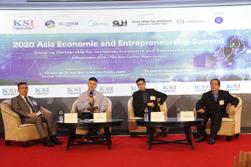 A panel at the 2020 Asia Economic and Entrepreneurship Summit in Kuala Lumpur on Sept 8, 2020 devotes to digitalization. (PHOTO PROVIDED TO CHINA DAILY)
A panel at the 2020 Asia Economic and Entrepreneurship Summit in Kuala Lumpur on Sept 8, 2020 devotes to digitalization. (PHOTO PROVIDED TO CHINA DAILY)
All stakeholders in Asia Pacific are expected to work together to fulfill the United Nations sustainable development goals (SDGs) and “leave no one behind” in post-pandemic digital times, according to the 2020 Asia Economic and Entrepreneurship Summit.
The SDGs, which were approved in 2015 by 193 UN member countries, form a blueprint meant to address the world’s most pressing problems by 2030. The 17 goals include the eradication of extreme poverty, halting deforestation, promoting gender equality, and reducing conflict
“The pandemic has highlighted that the government cannot do it alone,” said Maria Chin Abdullah, member of parliament for the Malaysian city of Petaling Jaya and former chairperson of the All Party Parliamentarians Group on SDG’s. We need a “whole society approach,” she said at a panel discussion during the summit in Kuala Lumpur.
Jointly organized by the KSI Strategic Institute for Asia Pacific, the Pacific Basin Economic Council and China Daily Asia Pacific, the summit features speeches by two Malaysian ministers and four panel events focusing on “Growing Partnership for Inclusive, Innovative and Sustainable Growth’’.
ALSO READ: UN chief asks for better financing systems for SDGs
The SDGs, which were approved in 2015 by 193 UN member countries, form a blueprint meant to address the world’s most pressing problems by 2030. The 17 goals include the eradication of extreme poverty, halting deforestation, promoting gender equality, and reducing conflict.
Maria said that many people understand and have experienced the effect of poverty, social inequality and water pollution. The pandemic has aggravated the impact of these social problems. She said this is why everyone, and not just the government, needs to know more and work towards meeting SDGs.
“The SDGs affect us all. We can’t run away from it,” Maria said.
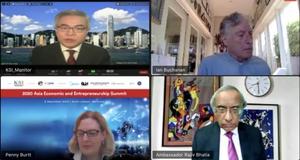 Panelists discuss the future of Asia Pacific economic cooperation at the 2020 Asia Economic and Entrepreneurship Summit in Kuala Lumpur on Sept 8, 2020. (PHOTO PROVIDED TO CHINA DAILY)
Panelists discuss the future of Asia Pacific economic cooperation at the 2020 Asia Economic and Entrepreneurship Summit in Kuala Lumpur on Sept 8, 2020. (PHOTO PROVIDED TO CHINA DAILY)
Xiao Geng, chairman of Hong Kong Institution for International Finance, noted how COVID-19 is a “social cost issue. The market can’t solve it.”
He cited China, which has mobilized both the central and local governments, allowing the country to curb the spread of the virus. He said China used social distancing and traditional health methods to stem the rise the number of infections.
ALSO READ: UN pledges to push universal health coverage by 2030
Xiao said that Asia in general has now become the center of global economy, with China contributing roughly 30 percent to the global GDP. “China is more confident in opening up its economy (as the center) of global economy is shifting towards Asia,” he said.
Mia Mikic, director of the trade, investment and innovation division at the United Nations Economic and Social Commission for Asia and the Pacific (UNESCAP), noted said that there’s danger that Asia-Pacific countries will lose the gains that they made because of the pandemic.
According to the UNESCAP’s SDG Progress report issued in March, the region has made significant progress in goals like cutting poverty and hunger incidence and promoting gender equality and decent work. The region, however, continues to struggle in advancing responsible consumption and production and climate action
“We really have to know how to recoup (the progress that we made) and (ensure that the) whole initiative in sustainable development (won’t) be lost to (the pandemic),” Mikic said.
She said all sectors need to change the way to address socio-economic problems.
ALSO READ: UN report: 2/3 population to live in cities, urban centers by 2050
“We have to change the way we do business,” she said, noting the need to prioritize initiatives that ‘leave no one behind’.
The call for change has been raised in other panel discussions that were held during the summit, with participants noting how the pandemic has profoundly changed the Asia-Pacific.
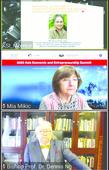 Partnering for the US Agenda 2030 is the focus for several experts at an afternoon panel at the summit. (PHOTO PROVIDED TO CHINA DAILY)
Partnering for the US Agenda 2030 is the focus for several experts at an afternoon panel at the summit. (PHOTO PROVIDED TO CHINA DAILY)
Realizing the goals need international cooperation in the direction of helping and enriching each other, regardless of the religion, race and ideology, said Bishop Professor Dr Dennis Ng, chairman of the Institute of International harmony and Sustainable Development from Hong Kong.
“If everyone is independent, sovereign, and can enrich mutually, our world can enter a more peaceful direction, that is, the direction of helping each other,” he said online.
Rajiv Bjhatia, distinguished fellow of Gateway House: Indian Council on Global Relations, discussed about the Vulnerability, Uncertainty, Complexity and Ambiguity (VUCA) that’s facing the region.
“I would submit that COVID-19 has created a far graver disruption, with its disastrous impact on health, life, livelihoods and economies of countries around the globe. It has been depicted as ‘the greatest shock to the international system since the Second World War,’ he said.
Bhatia highlighted the importance of the “Blue Economy” for economic development.
“Its relevance has increased dramatically in the Covid-19 era of economic recession. Industry 4.0 technologies will need to be deployed to generate additional income sources for humankind. Our oceans offer immense potential, but their development needs to be undertaken sustainably, thus making it environment-friendly,” he said.
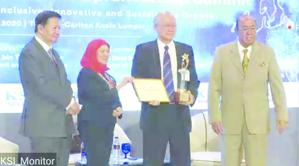 The summit also holds presentation of Lifetime Achievement Awards for several personalities. (PHOTO PROVIDED TO CHINA DAILY)
The summit also holds presentation of Lifetime Achievement Awards for several personalities. (PHOTO PROVIDED TO CHINA DAILY)
Digital operations will help transform societies and overcome “information equality” in developing countries and even in more developed economies, according to panelists.
Omna Sreeni-Ong, founder of ENGENDER Consultancy of Malaysia, shared her sessions with people in slum communities, seeing capacity in young members there, a strategic principle for achieving the United Nations sustainable development goals.
“It’s about showing respect” to every community so that they can change and share the SDG issues, she said.
At the panel of “Digital Asia Pacific – Connecting Markets & Opportunities Through Digitalization”, Dato Henry Goh, co-founder and chief operating officer at Macrokiosk Bhd, said infrastructure capacity building for the poor and in rural areas enables Malaysia to embrace the digital age.
A similar story is going on in Negara Brunei Darussalam, according to Shazali Sulaiman, partner of Shazali & Partners from Brunei. The government owns key telecom assets to ensure everyone is connected, even in rural and remote areas. The move actually ends “Information poverty” that could be seen in some economies, he said.
However, Shazali said there is still a need to fine tune the skills of youths and train people in various industries on digitalization.
But from the perspective of companies, cooperation is more necessary and beneficial for different partners either in ASEAN, in China, in South Korea, Japan or the USA, said Goh.
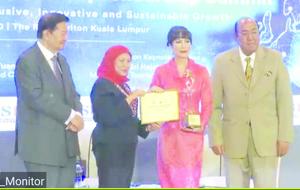 Women are among awardees of Lifetime Achievement Awards presented at the summit. (PHOTO PROVIDED TO CHINA DAILY)
Women are among awardees of Lifetime Achievement Awards presented at the summit. (PHOTO PROVIDED TO CHINA DAILY)
Dato Dr Chin Yew Sin, advisor for Asia Pacific region at the Global One Belt One Road Association, said though much backward for decades, China can utilize technology in innovative ways, and even allow its many groups to bypass development stages with digital economies.
Chin is expecting China to be strong both economically and technology-wise in the next 10 to 15 years, as the people are innovative and eager to learn, and their students are strong in STEM factors.
A similar path can be seen in Indonesia. Chin said as one of the E-7 economies which also include Brazil, China, India, Mexico, Russia and Turkey, can fare much better than average in the near future as one of their measures for Indonesia is to encourage students to get strong in STEM.
Adam Yee, president and CEO of SIEMENS Malaysia Sdn Bhd, pointed out that there must be challenges in the journey toward digital transformation, and information security or cybersecurity is one of them. Feeling insure at connectivity is a hurdle for everyone, especially those who refuse online purchases and banking.
Law enforcement on privacy protection in any economy is important for the authorities, Yee said.
Another trend enabled unfortunately by the pandemic is working from home. It seems everyone should be able to work remotely in the future, and then there could be too much space at the office.
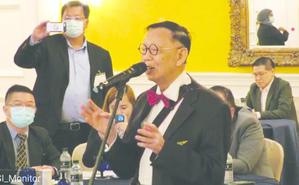 Panel discussions include time for questions and answers at the summit. (PHOTO PROVIDED TO CHINA DAILY)
Panel discussions include time for questions and answers at the summit. (PHOTO PROVIDED TO CHINA DAILY)
Datuk Dr Denison Jayasooria, Co-Chairman of CSO-SDG Alliance Malaysia, said in the end it’s not just dollars and cents, but “harmony and peace for not only us and our families, but also for generations to come”.
Diplomats participated in discussions on the Indo-Pacific Outlook and Vision. “It’s about a rules-based order. It’s about ensuring that conflict and cooperation are managed in an agreed framework,” said Andrew Goledzinowski AM, High Commissioner of Australia to Malaysia.
Charles Hay, High Commissioner of the United Kingdom to Malaysia, stressed the need to maintain free and fair trade. Hiroshi Oka, Ambassador of Japan to Malaysia, said it’s important to enhance connectivity in the international community. But that should go beyond building ports and railways to promote global trade.
Oka said connectivity is also about building cross-border connections and encouraging more people to people exchanges.
Contact the writers at prime@chinadailyapac.com.


